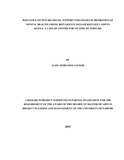| dc.description.abstract | The need for psycho-social program for refugees living in refugee camps is overwhelming. In
Dadaab refugee camp in Kenya, the Center for Victims of Torture is providing psychosocial
support for the thousands of refugees living in the camp. This study therefore seeks to assess
the influence of psycho-social support strategies in promotion of mental health among the
refugee population in Dadaab refugee camp. In particular, community sensitization, local
advocacy, psycho-social counseling and capacity building strategies were assessed. The study
follows descriptive design; both primary and secondary methods of data collection were used
to obtain information on the perceptions of the direct beneficiaries of CVT project on the
influence of the strategies. Individual In depth Interviews (IDIs) and Key Informant
interviews (KII) were conducted. A total of 260 respondents were interviewed during the
study. This Sample size was determined using Krejcie and Morgan (1970) formula based on
the target population of 786. Stratified random sampling was used to select sample size in
each stratum. Questionnaire was administered to the beneficiaries and the Key Informant
Interviews were conducted to the representatives of NGOs in Mental Health projects using
interview guide. The target population defines those units for which the findings of the survey
were meant to generalize (Dornyei, 2007). The target population for this study was 736 direct
beneficiaries of Center for Victims of Torture mental health project in Dadaab Refugee Camp
from 2011 – 2013 and 50 representatives from 12 NGOs in Mental Health projects. Expert
opinions from the supervisor were done to help established the validity in order to collect
reliable data under the guidance of the research project supervisor. Consistent data analysis
was done in order to avoid errors, omissions, exaggerations and biases. All data were done
with the aid of Statistical Package for Social Sciences.
The study findings were therefore not only forming the basis for using better strategies on the
delivery of mental services in Dadaab refugee camp but also the promotion of psychosocial
support and to offer policy recommendations for donors, NGOs, Government agencies and all
other relevant stakeholders. The questionnaire return rate of this study was 93.1% of which
represents 242 out 260 sampled and the study generated additional and valuable knowledge on
evaluation of psycho-social support strategies on the promotion of mental health in Dadaab
and other refugee camps around the world. Those refugees who came to CVT received
psychosocial supports, such as counselling, capacity building, referrals to other organizations,
and various other psychosocial supports. The findings indicated that the psychosocial services
were helpful in overcoming the traumatic experiences to a certain extent, while some of the
program efforts met their needs in part. However, they faced huge challenges in the
community; these included persistent stigmatization, recurring nightmares, psychological
problems, loss of family members, as well as poverty and limited economic opportunities in
Dadaab refugee camp. When the project beneficial (clients) left CVT centers and went back to
their community, it was found that they were overwhelmed by several serious challenges,
which indicates a gap and shortcoming in the provision of psychosocial services and
reintegration efforts of such program in the humanitarian context. The findings therefore
highlight an urgent need for donor and humanitarian communities to support, fund and
empower refugees to meet their mental health challenges. A framework for improved delivery
of services is also suggested. This constitutes an interactive integrated model that is based on
better interaction and collaboration between the social services, the family and the community
systems, in ensuring effective psychosocial support for refugees living in Dadaab refugee
camps and other parts of similar situation in the world. | en_US |

